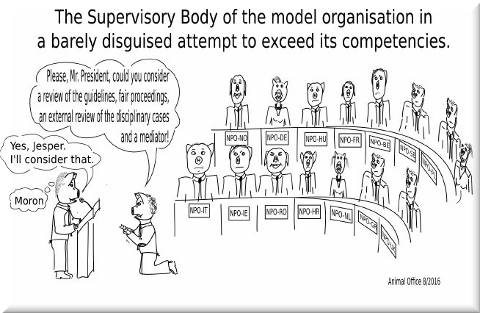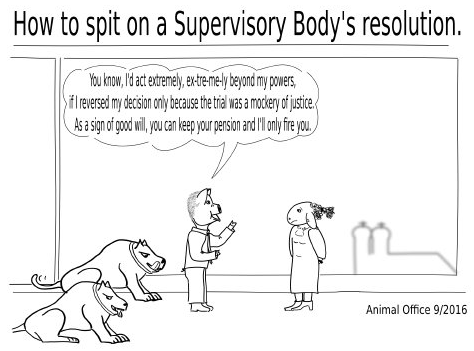

The thin independence of DG3
In its ruling R19/12 of May 2014, the Enlarged Board of Appeal found that the executive functions of the Vice-President of DG3 were incompatible with his judiciary function as, Chairman of the Enlarged Board. In response, Mr Battistelli relieved VP3 of most of his executive functions flowing from Article 10(3) EPC. He furthermore put all DG3 members directly under his authority for administrative requests (duty travel, approval of lectures, side activities etc.). This clearly infringes upon the independence of the Board members.
A further attack on the independence of DG3 occurred in December 2014 when a Member of the Boards of Appeal was subjected to a "house ban" by the President. The initial accusation was defamation of VP4. As usual these days, further accusations were added during the procedure. A first request to the Enlarged Board of Appeal to propose his removal from office was rejected by the Enlarged Board of Appeal after a hearing in September 2014 on the grounds that the accusations were insufficiently substantiated. In the October meeting of the Administrative Council, Mr Battistelli asked the Council to dismiss the colleague concerned without the required proposal of the Enlarged Board. The Council refused and instead decided to submit a second request to the Enlarged Board to propose removal from office. During a second hearing before the Enlarged Board in February, the representatives of the Council withdrew their second request. The correct thing to do now would be to lift the suspension and reinstate the colleague concerned. In the mean time, Mr Battistelli persuaded the Council to change the law governing suspensions. In December last year a majority of the delegates voted in favour of CA/D 18/15 [NL and DE voted against; FR GR SE and SK abstained]. This amendment to the ServRegs gives the Council the power to suspend a member of the EPO's judicial branch (i.e. members of 9the Boards) on a salary reduced by up to 50% for up to 24 months - or even longer in "exceptional cases". The amendment applies in a retroactive manner to the pending DG3 case. Aside from the question concerning the legality of such retroactive application, the measure has a negative impact on the independence of DG3 as a whole. The Council has now granted itself the power - whether acting alone or in concert with the President - to sideline any "irksome judge" without the need to observe due process by following the procedure foreseen in Article 23(1) EPC.
The next attack is possibly in preparation, with the so-called proposal for a structural reform of the EPO Boards of Appeal. An internal working group, the DG5 task force, had been entrusted with the mission of drafting the proposal. However, faced with the manifest unwillingness of the Office to propose measures really improving the independence of the Boards and with massive headwind from interested circles, the Council obliged the President to withdraw his orientation paper CA/98/15 and decided to take over in December. A status report is foreseen for the March Council meeting, with more concrete measures for the June meeting. However, the five “main points” of the reform, as sketched by the Swiss delegation during the December meeting , do not necessarily bode well for the future.

EPO 'justice' -- only the pension restored by Battistelli in an effort to salvage his job (as time is running out for Battistelli and he may soon come under more attacks from Board 28)